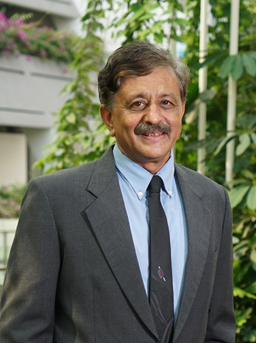Nano-Materials in Medicine- When only Nano will do
 Speaker: Professor Subbu Venkatraman
Speaker: Professor Subbu Venkatraman Affiliation: Executive Director, ILO NUS; Adj Professor, Materials Science & Engineering, NUS
Host: Associate Professor Shaffique Adam
Abstract Details:
Fueled by our abilities to compute materials properties and characteristics orders of magnitude faster than they can be measured and recent advancements in harnessing literature data, we are entering the era of the fourth paradigm of science: data-driven materials design. The Materials Project (www.materialsproject.org) uses supercomputing together with state-of-the-art quantum mechanical theory to compute the properties of all known inorganic materials and beyond, design novel materials and offer the data for free to the community together with online analysis and design algorithms.
Nano-materials hold much promise in Medicine, both for in vivo imaging and for therapeutic applications. In particular, nanomaterials have been heavily researched for selective cancer therapy, with the promise of reduced side effects. This has only partially been realized. Since the introduction of the first Nanotherapeutic (Doxil®) in 1995, very few nano-carrier based systems have been approved for use on human patients. I will trace the history of nanotherapeutic products to date, and explain why translation to the clinic has been slow, with a low success rate.
Our work on Nanotherapeutics:
Based on our experience in the field, it appears certain now that no one nanomaterial will address or revolutionize therapy. We will examine the advantages and limitations of current nanocarrier systems, vis-à-vis microcarriers. In particular, I will focus on gene delivery, and explain why for delivering mRNA and siRNA, nanocarriers are essential. In addition to profiling many approaches to gene silencing, I will discuss our approach to gene silencing using a polyelectrolyte layer-by-layer systems and explain why this system can be both selective and long-lasting in its effects on prevention of fibrosis.
Based on our success with nanotechnology for gene silencing, I will outline the possibilities for mRNA therapeutics and examine the need for nanotechnology for vaccine delivery.
References
1. YF Tan, RC Mundargi, MHA Chen, J Lessig, B Neu, S Venkatraman, TT Wong. Layer-by-layer nanoparticles as an efficient siRNA delivery vehicle for SPARC silencing, SMALL, 10 (9), pp1790-1799 (2014);
About The Speaker:
Professor Subbu Venkatraman has a PhD in Polymer Chemistry from Carnegie-Mellon University. He has spent about 15 years in materials and biomedical R&D in the USA, working with various applications of polymeric materials, before joining NTU as an Associate Professor in 2000. He was instrumental in starting the Biomaterials effort in NTU and developing the paradigm of research driven by medical needs. He served as Associate Chair for Research for 6 years, before taking over as Chair in 2011. Under his watch the School jumped 41 places in the rankings to #3 as per the QS rankings, and #1 as per the US News & World Report rankings.
He has published extensively in the field of biomaterials, with a total of 270 publications, H-index of 47 and a citation count of 8350. He also holds 70 granted patents from a total of 171 applications. His translational work in biomaterials has led to 3 spin-off companies, with one of them (Amaranth Medical) obtaining substantial series C funding. He has also received the 2014 Singapore President's Technology Award together with Prof Freddy Boey and Adjunct A/P Tina Wong, for their innovative application of nanostructures and novel drug delivery approach to combat blindness from glaucoma. He is also the co-founder of Peregrine Ophthlamic Pte Ltd and Amaranth Medical Pte Ltd.
His research group is interested in designing and modifying materials for biomedical applications. In particular, current focus is on nanotechnological approaches to enhance the efficacy of protein drugs and genes. Based on his approaches, he hopes to improve the commercialization track record of nanomedicine approvals.
This webinar is over. You may watch the recorded video in our YouTube page at https://youtu.be/EpfTtgh-m7c
—
To view all the upcoming seminars, you can visit: https://graphene.nus.edu.sg/news-events/events/
You may also Like & Subscribe our following channels below to receive instant notifications for new announcements.
